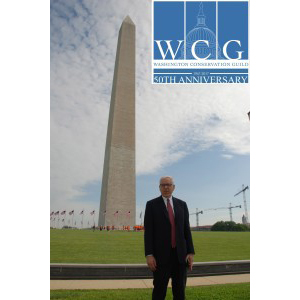Holiday Party with Special Speaker David M. Rubenstein
Xiao Ma
Charles E. Culpeper Advanced Fellow in Conservation Science, Scientific Research Department, Division of Conservation, National Gallery of Art
Diana Galante
President, Washington Conservation Guild

David M. Rubenstein began his career as a lawyer and served in the federal government, including an appointment as Deputy Assistant to President Jimmy Carter for Domestic Policy. In 1987, he co-founded The Carlyle Group, a global alternative asset manager. In addition to having interests in a variety of educational, medical and business associations, he is the Chairman of the Board of Regents of the Smithsonian Institution, a Trustee of the National Gallery of Art, and Chairman of the Madison Council of the Library of Congress.
He supports a number of conservation projects and has been a major donor to the National Park Service. He has made significant contributions to the restorations of the Lincoln Memorial, the Washington Monument, James Madison’s Montpelier, Thomas Jefferson’s Monticello, and the Renwick Gallery of the Smithsonian American Art Museum. He has also been a strong supporter of the Washington Library at Mount Vernon and the National Archives, as one of his passions is for the preservation of historic documents with the goal of making them accessible to the general public.
During his talk, David M. Rubenstein shared his views on the importance of cultural heritage and its preservation through his perspective on the field as a donor. Mr. Rubenstein began by sharing the story of how he was introduced to the field of historic preservation. On a trip to New York in 2007, he was invited to view the 1297 Magna Carta at Sotheby’s, which was to be sold at auction the following day. After viewing the document, he was moved to make a bid as he thought it was important that this document stay in the United States on public view. To his surprise, he won the auction. His Magna Carta is now on display at the National Archives.
The purchase of the Magna Carta sparked his interest in collecting and preserving historic documents; he also owns William J. Stone engravings of the Declaration of Independence, and copies of the Emancipation Proclamation and the 13th Amendment, among others. This interest eventually evolved into a desire to preserve iconic American monuments and restore the estates of our Founding Fathers to more accurately represent the appearance and history of the sites.
Mr. Rubenstein shared his belief that if people actually see the original copies of these great historic documents and have the opportunity to experience these sites as they were during their functional era, rather than facsimiles or digital reproductions, they will be inspired to learn about the history behind them. He believes that his contribution to our country lies in preserving these items in an effort to encourage people to learn about American history. He also sponsors a congressional education program where historians are invited to speak with members of Congress that will expand their knowledge and understanding of American history.
Following his talk, Mr. Rubenstein spent a few minutes answering questions from the audience. Most questions revolved around suggestions or thoughts Mr. Rubenstein might have for conservators regarding advocacy for the field, both within and outside of their institutions to generate interest and more funding for conservation work. Others were curious about his interactions with conservators during the various restoration projects he has funded.
He began by saying that in terms of the purchase, conservation, and potential display of an artifact such as a historical document, he requires research into its authenticity and its provenance from the beginning. He scrutinizes the condition with his advisers to ensure the artifact can be restored successfully. Then after the purchase, he works with preservation specialists on the best ways to transport and display the artifact.
Mr. Rubenstein indicated he is mostly alone in his role as a major supporter of conservation and artifact preservation when compared to his peers, who have other philanthropic interests, or collect fine art rather than historic documents. While he could not outline a definitive means to elicit donations for conservation projects, he did suggest trying to get potential donors such as trustees personally involved by inviting them to conservation labs, but also confessed that many donors do not have the patience to explore the detailed work there. He also advised allowing donors to link their names to positions, sites, or projects.
The Washington Conservation Guild is grateful to David M. Rubenstein for donating his time so generously to make our event possible, and also to the Folger Shakespeare Library for hosting us.
For more information on David M. Rubenstein, visit http://www.davidrubenstein.com/